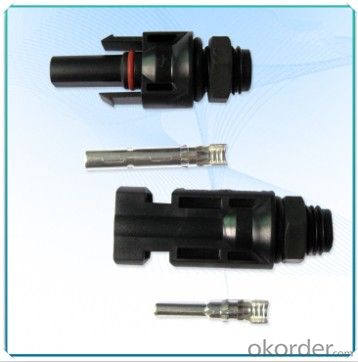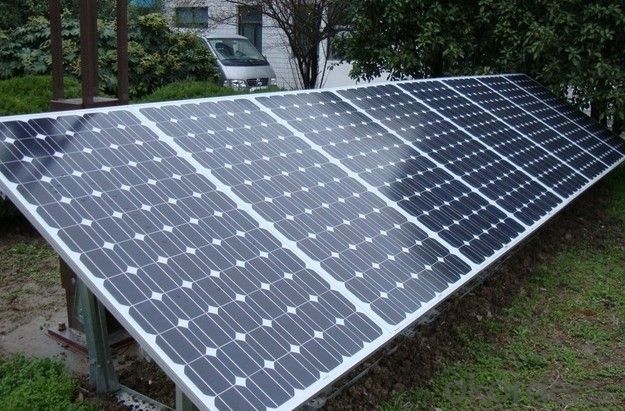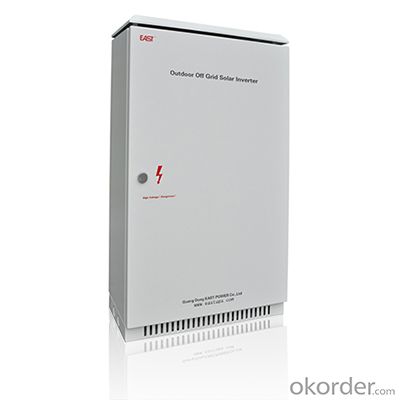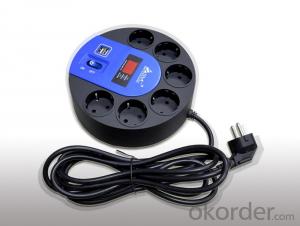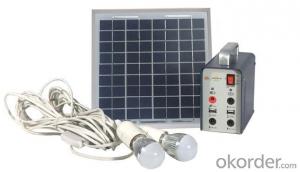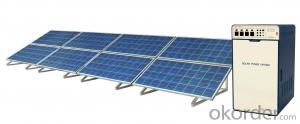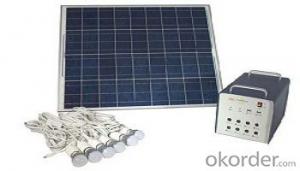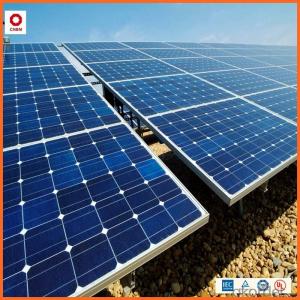Solar Energy Systems St. Paul MC4 Panel Connector - Simple, Quick and Safe Assembly
- Loading Port:
- Tianjin
- Payment Terms:
- TT OR LC
- Min Order Qty:
- 10000 pc
- Supply Capability:
- 1000000 pc/month
OKorder Service Pledge
OKorder Financial Service
You Might Also Like
Specification
MC4 panel connector (YF-1001-P) |
Description |
|
Parameter :
Model | YF-1001-P |
Type | MC4 Panel connector |
Rate voltage | DC1000V |
Junction current | 25A |
Contact Resistance | <0.3mΩ |
Safety Class | class Ⅱ |
Waterproof Grade | IP65 |
Temperature Range | -40℃~+85℃ |
Cable Standard | 2.5/4/6mm2 |
Flame Retardant Grade | UL94-V0 |
Insulation Material | PPO |
Composite Contact Material | Copper, silver plating |
Certification | TUV ,ETL |
Warranty | 12 months |
QTY/Ctn | 1000pairs/ctn |
Packing | Plastic bag |
Carton Size/Weight | 48*36*36CM , 22Kgs |
FAQ
1. How long will my inquiry get response?
Your inquiry related to our products or prices will be replied within 24 hours.
2. Can I get professional service and suggestion?
Well-trained and experienced staffs to answer all your questions in fluent English.
3. Do you accept OEM or customized design?
OEM & ODM, any your customized lightings we can help you to design and put into product.
4. What if I need specific design?
Distributorship are offered for your unique design and some our current models.


- Q: Can solar panels be installed on floating platforms or structures?
- Yes, solar panels can be installed on floating platforms or structures. In fact, floating solar, also known as floating photovoltaic (FPV) systems, is a growing trend in renewable energy. These systems are installed on bodies of water such as lakes, reservoirs, and even oceans. Floating solar panels offer several advantages, including increased efficiency due to the cooling effect of water and the ability to utilize unused water surfaces. Additionally, they can provide renewable energy in areas with limited land availability, making them a viable solution for expanding solar power generation.
- Q: What is the role of batteries in off-grid solar energy systems?
- The role of batteries in off-grid solar energy systems is crucial as they serve as the primary storage devices for the generated solar energy. In off-grid systems, where there is no access to a utility grid, batteries are used to store excess solar energy produced during the day for use during the night or when the sun is not shining. Batteries store the energy in the form of chemical potential energy, which is converted back into electrical energy when needed. This allows for a continuous and reliable power supply, ensuring that electricity is available even when solar panels are not producing energy. Additionally, batteries provide stability and balance to the off-grid solar systems. They act as a buffer, absorbing fluctuations in energy production and demand. For instance, during periods of high energy demand, the batteries can discharge their stored energy to meet the load requirements, preventing any interruptions or power shortages. Furthermore, batteries also play a crucial role in maintaining the longevity and efficiency of the solar panels. By storing excess energy, batteries prevent the solar panels from being stressed by overproduction, which can lead to premature wear and tear or even damage. In conclusion, batteries are an essential component of off-grid solar energy systems as they enable energy storage, provide stability, and ensure a continuous power supply, making them indispensable for reliable and sustainable off-grid electricity generation.
- Q: Can a solar energy system be installed in a coastal area?
- Yes, a solar energy system can be installed in a coastal area. In fact, coastal areas can be ideal locations for solar installations due to their abundant sunlight and proximity to the ocean. However, there are certain factors that need to be considered when installing a solar energy system in a coastal area. One of the primary considerations is the corrosive nature of the salty air in coastal regions. Salt can accelerate the degradation of certain components of a solar system, such as metal frames, electrical connections, and even the solar panels themselves. To combat this, it is essential to use corrosion-resistant materials and regularly clean and maintain the system to remove any salt buildup. Another consideration is the potential impact of strong winds and storms that are common in coastal areas. Solar panels and mounting structures need to be designed and installed to withstand these extreme weather conditions. Reinforced anchoring and proper installation techniques can help ensure the stability and durability of the system in high wind areas. Additionally, it is important to assess the impact of coastal erosion or flooding on the solar energy system's location. Proper site selection and elevation can help minimize the risk of damage from these environmental factors. Despite these challenges, with proper planning, design, and maintenance, a solar energy system can be successfully installed and operated in a coastal area. The benefits of harnessing the abundant sunlight in these regions can outweigh the potential challenges, making solar energy a viable and sustainable option for coastal communities.
- Q: Can solar energy systems be used for powering schools or educational institutions?
- Yes, solar energy systems can be used to power schools or educational institutions. In fact, many schools and educational institutions around the world are adopting solar energy systems as a sustainable and clean source of power. Solar energy systems, such as solar panels, can be installed on the roofs of school buildings or in open spaces on the school campus to harness the power of the sun. This renewable energy source can generate electricity to meet a significant portion of the school's power needs. There are several benefits to using solar energy systems in schools. Firstly, solar power is a clean source of energy that does not produce harmful emissions or contribute to air pollution, thus helping to reduce the carbon footprint of the educational institution. Additionally, solar energy systems can help schools save money on their electricity bills in the long run, as they can generate electricity for free once the initial installation costs are recovered. These savings can be reinvested in educational resources or programs. Moreover, integrating solar energy systems into schools can provide valuable educational opportunities for students. By utilizing solar power, schools can educate their students about renewable energy, climate change, and the importance of sustainable practices. Students can learn about the science behind solar energy, the benefits of clean energy sources, and the role they can play in promoting a greener future. Furthermore, solar energy systems can also serve as a backup power source during power outages or emergencies, ensuring uninterrupted power supply to the school, especially during critical times such as exams or in areas with unreliable electricity infrastructure. In conclusion, solar energy systems can indeed be used to power schools or educational institutions. They offer numerous benefits, including reduced carbon emissions, cost savings, educational opportunities, and backup power capabilities. By embracing solar power, schools can demonstrate their commitment to sustainability, inspire students, and contribute to a cleaner and greener future.
- Q: How do solar energy systems impact water quality?
- Solar energy systems have a minimal impact on water quality compared to other sources of energy. Unlike fossil fuels, solar power does not release harmful pollutants or contaminants into water sources during electricity generation. However, water is still required for the production of solar panels, and if not managed properly, the extraction of materials and manufacturing processes can have some localized impacts on water quality. Overall, the impact of solar energy systems on water quality is significantly lower compared to traditional energy sources.
- Q: What are the main features of solar photovoltaic systems
- Compared with the commonly used thermal power generation system, the advantages of photovoltaic power generation:No danger of depletion; safe and reliable, no noise, no pollution, absolutely clean (pollution-free); not subject to geographical distribution of the resources, can take advantage of the building roof; for example, areas without electricity, and complex terrain area; no fuel consumption and the erection of transmission line can be on-site power supply high quality energy;; users emotionally receptive; the construction period is short, get energy to spend a short time.
- Q: What is the difference between on-grid and off-grid solar energy systems?
- On-grid solar energy systems are connected to the local utility grid, allowing excess electricity to be fed back into the grid and enabling the user to draw power from the grid when needed. Off-grid solar energy systems, on the other hand, operate independently and are not connected to the utility grid. They typically rely on batteries to store excess energy for use during times when the sun is not shining.
- Q: Can solar energy systems be used in areas with frequent snowfall?
- Yes, solar energy systems can still be used in areas with frequent snowfall. While snow can temporarily reduce the efficiency of solar panels by covering them, modern solar panel designs and technologies are capable of generating electricity even in low light conditions. Additionally, the angle at which solar panels are installed can be optimized to allow snow to slide off more easily. With proper maintenance and snow removal, solar energy systems can still be a viable and sustainable energy solution in snowy regions.
- Q: Can solar energy systems be used in areas with limited access to training programs?
- Yes, solar energy systems can be used in areas with limited access to training programs. While training programs can be helpful in understanding the technical aspects of installing and maintaining solar energy systems, there are various resources available that can still enable individuals to utilize solar energy. Online tutorials, manuals, and guides can provide valuable information on the installation and operation of solar systems. Additionally, local experts or organizations can offer assistance and support in areas with limited access to formal training programs, ensuring the successful implementation of solar energy systems.
- Q: What is the maintenance cost of a solar energy system?
- The maintenance cost of a solar energy system can vary depending on factors such as the size of the system, the type of panels used, and the location. However, in general, the maintenance cost of a solar energy system is relatively low. It mainly involves regular cleaning of the panels to ensure optimal efficiency and occasional inspection of the system components. Additionally, periodic servicing and potential repairs may be necessary over the lifespan of the system. Overall, the maintenance cost is typically considered minimal compared to the long-term savings and environmental benefits provided by solar energy.
Send your message to us
Solar Energy Systems St. Paul MC4 Panel Connector - Simple, Quick and Safe Assembly
- Loading Port:
- Tianjin
- Payment Terms:
- TT OR LC
- Min Order Qty:
- 10000 pc
- Supply Capability:
- 1000000 pc/month
OKorder Service Pledge
OKorder Financial Service
Similar products
Hot products
Hot Searches
Related keywords



